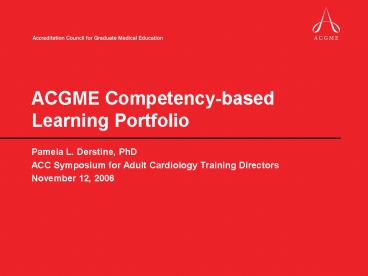ACGME Competencybased Learning Portfolio - PowerPoint PPT Presentation
1 / 26
Title:
ACGME Competencybased Learning Portfolio
Description:
Continuous Personal & Professional. Development. My Professional. Development ... elements enabling documentation of competence for initial certification ... – PowerPoint PPT presentation
Number of Views:52
Avg rating:3.0/5.0
Title: ACGME Competencybased Learning Portfolio
1
ACGME Competency-based Learning Portfolio
- Pamela L. Derstine, PhD
- ACC Symposium for Adult Cardiology Training
Directors - November 12, 2006
2
Objectives for Today
- Why a learning portfolio?
- How might it be used?
- What are the underlying principles and policies?
- Your questions and concerns
3
Why an ACGME Learning Portfolio?
- Competency-based accreditation
- Support the formation of professionals
4
Competency-based Accreditation
- Mission
- We improve healthcare by assessing and
advancing the quality of resident education
through accreditation
5
Competency-based Accreditation
- VisionExemplary accreditation
- ValuesAccountabilityExcellenceProfessional
ism
6
Competency-based Accreditation
- Strategic Priorities- Foster innovation and
improvement in the learning environment-
Increase the accreditation emphasis on
educational outcomes- Increase efficiency and
reduce burden in accreditation- Improve
communication and collaboration with key
internal and external stakeholders
7
Competency-based Accreditation
- Common set of competency-based outcomes in Common
Program Requirements (except PC/MK) - Common PIF questions
- Common citation glossary
8
(No Transcript)
9
Result.
- Increased consistency among RCs regarding
expectations for competency-based outcomes - Better communication of expectations with program
directors - Reduced burden in preparing PIFs
- Greater consistency regarding decisions, related
citations - Faster feedback formative feedback from RCs
- Focused institutional responsibilities and
resources for programsless work for individual
program directors
10
Support Formation of Professionals
- Natural alignment of portfolio assessment with
principles of competency-based education - Flexible support for development throughout
training and practice
11
- Pivotal Role
- of Learner
- Reflection
- Multiple assessment tools
- Authentic tasks
- Transparent
- Formative feedback from multiple sources
- Model for CPD
Competency- Based Education
Learning Portfolio
12
ACGME Learning Portfolio
13
My Reflective Learning
Curriculum Evaluation
My Professional Development
14
Curriculum Evaluation
Resident/Faculty User Transparent
15
Curriculum Evaluation
- Global evaluations of benchmarks for competence
- Assessment of ability to meet learning
objectives(data collection tools) - Mini CEX
- Projects-EBM, QI
16
My Reflective Learning
17
My Reflective Learning
- Journal Writing
- Threaded Discussions
- Mentor Interaction
- Practice Feedback
- Critical Incidents
- Self-Assessment
- Learning Plans
- Logs
18
My Professional Development
- Certification
- Maintenance of Certification
- Practice Improvement
- Continuous Personal Professional
- Development
19
Underpinning Principles
- Begins in residency
- Designed for interoperability with medical school
and other portfolios (if IOP compliant) - Graduated resident can continue to enter data
into their ACGME portfolio
20
Underpinning Principles
- Owned by resident resident controls access
except - PDs see portfolio elements enabling
documentation of competence for initial
certification - DIOs see aggregate data on program performance
and types of assessment tools
21
Underpinning Principles
- RCs see aggregate assessment data, anonymous data
on ranges of individual performance on some
measures, other data as permitted by resident - IRC sees what assessment tools are used across
programs in an institution
22
Operating Policies
- Library of best practice evaluation tools
provided may be altered by specialty
specialties may add tools - Made available free of charge to all ACGME
accredited GME programs - Use not mandated certain data points will be
required for accreditation regardless of source
23
Operating Policies
- Confidentiality of data is primary concern
- Any cooperative arrangements must not affect
operations of the GME portfolio - Continuous improvement, innovation, and evolution
of the portfolio are fundamental operating tenets
24
Timeline
- Phase 1 invitation to respond to challenge of
using ACGME portfolio (12-18 months) concurrent
alpha testing (begin 2007) - Phase 2 beta testing in volunteer programs
(broad representation by specialty, geography,
program type, etc. 12-18 months begin 2008)
25
Timeline
- Phase 3 Deployed but not mandatory RCs
learning how to use portfolio for accreditation
review and decisions - Phase 4 Distributed use new accreditation
model (5 years and ongoing)
26
Your Questions and Concerns

